Crewe Surname Ancestry ResultsOur indexes 1000-1999 include entries for the spelling 'crewe'. In the period you have requested, we have the following 293 records (displaying 11 to 20): Single Surname Subscription | | | Buying all 293 results of this search individually would cost £1,432.00. But you can have free access to all 293 records for a year, to view, to save and print, for £100. Save £1,332.00. More... |
These sample scans are from the original record. You will get scans of the full pages or articles where the surname you searched for has been found. Your web browser may prevent the sample windows from opening; in this case please change your browser settings to allow pop-up windows from this site. Plenary Remission of Sins: Diocese of Coventry and Lichfield
(1404-1415)
Individuals (laymen, monks or priests) could obtain indults or indulgences from the Pope that a confessor of their choice might give them, being penitent, plenary remission of sins, once only, in articulo mortis. Lists of these indults, headed De Plenaria Remissione, were entered in the Lateran Regesta in the Vatican archives; from the reigns of popes Innocent VII to John XXIII (1404 to 1415) there are such lists in volumes CXIX, CXXXI, CLIX to CLXI, CLXV, CLXVII and CLXXXIV, from the first year of Innocent VII, the second year of Gregory XII, and the second to fifth years of John XXIII. Those relating to the British Isles were copied and translated by J. A. Twemlow, and printed under the direction of the Master of the Rolls in 1904. The diocese of Coventry and Lichfield covered Cheshire, Staffordshire, Derbyshire, Lancashire south of the Ribble, northern Shropshire and northern Warwickshire.CREWE. Cost: £4.00.  | Sample scan, click to enlarge

| Inhabitants of Stratford upon Avon in Warwickshire
(1406-1535)
The Hospital of the Holy Cross was founded in 1269; in time this fraternity became a social and religious gild. 'The Register of the Gild of the Holy Cross, the Blessed Mary and St John the Baptist of Stratford-upon-Avon' was edited by J. Harvey Bloom, rector of Whitchurch, and printed in 1907. The register is a record of admissions to the gild, an account of the fines paid by new members, and the names of those in arrear. Each year's record usually starts on the Monday after Ascension Day (the sixth Thursday after Easter), when the new aldermen, master and proctors of the gild were elected, all duly named. Then follow the admissions to the gild, including payments for prayers and candles (lights) for the faithful dead; and the names of the sureties for these payments. Interspersed with this are occasional proclamations and memoranda concerning the fraternity. A peculiarity of this publication is that the years given at the head of each page (e. g. 1502-3) are those of the regnal year (in that case 18 Henry VII) in which the Monday after Ascension Day fell. The regnal years of Henry IV, Henry VI, Richard III and Henry VII all started after that day in the calendars of 1399, 1422, 1483 and 1485; so the gild registers during those years actually cover the following year to that shown in this printed text (in that case, 1503-4).
CREWE. Cost: £4.00.  | Sample scan, click to enlarge
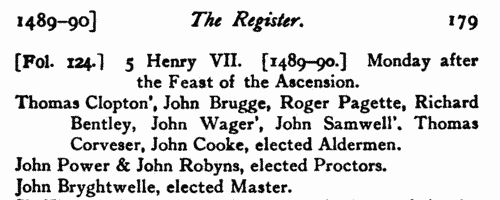
| Murderers sheltering in Beverley Minster: and their victims
(1478-1539)
Criminals could evade pursuit by claiming sanctuary in the church of St John in Beverley, in the East Riding of Yorkshire. This liberty of the minster extended a league in every direction from the church door, and was divided into six sections, each giving greater sanctity to the rights of sanctuary, the sixth and innermost section being the presbitery or chancel. Near the altar there was a stone chair called the Frith Stool, seated on which an accused could claim total immunity. The bailiff would receive the oath of the fugitive, and a clerk recorded 'what man he killed, and wher with, and both ther namez'; the bailiff receiving a fee of 2s 4d, the clerk 4d. Sanctuary was afforded for 30 days, with food and lodging, after which the fugitive was protected to the borders of the county. But within 40 days he had to appear before the coroner, clothed in sackcloth, and be branded on his right hand with the sign of the letter A. This signified that he was swearing to abjure the realm: he was then free to leave the country unhindered. At Beverley the clerks kept a separate register of fugitives' petitions, which survives from 1478 to 1539 in Harleian Manuscript 560. It was edited and printed by the Surtees Society in 1837 under the title Sanctuarium Beverlacense. Some of the criminals came from a considerable distance: the great majority were murderers or homicides. Each entry usually gives full name, original address, (often) trade, a brief description of the crime, often with date, and usually the name of the victim. This index covers all the surnames given.CREWE. Cost: £4.00.  | Sample scan, click to enlarge
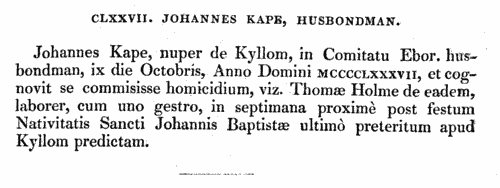
| Freemen of London
(1540-1550)
The long series of mediaeval registers and books of admission of the freemen of London was destroyed by fire in 1786. Thirty surviving charred leaves were gathered together and rebound, becoming Egerton MS 2408 in the British Museum. The order is jumbled and generally speaking none can be dated with certainty, although all belong to the very end of the reign of Henry VIII and the start of the reign of his son, Edward VI. These are pages from the admission books. Each entry here usually gives the name of the person admitted to the freedom; his father's name, address and occupation; his entitlement to the freedom, usually by having served out an apprenticeship to a citizen, naming the master and his trade. Then there may follow a cross-reference to M. or N., being two volumes of another set of official books denoted by the letters of the alphabet, and following each other in chronological sequence, which evidently gave details of entries into apprenticeships. These other books no longer exist: but the dates given for entry do identify the start of the apprenticeship, and so give by implication a date for the eventual admission to freedom. In the margin is the name of the city ward and the total of the fee and fine paid on admission.CREWE. Cost: £4.00.  | Sample scan, click to enlarge

| Tradesmen of York
(1272-1558)
No man or woman could trade in the city of York without having obtained 'freedom' of the city.Their names were recorded on the 'Freemen's Roll', or Register of the Freemen of the City of York, which contains about 19,900 names for this period. A list of names was prepared for each year, the year being here reckoned as starting at Michaelmas (29 September) until 1373, and thence at Candlemas (2 February). Each annual list starts with the name of the mayor and the camerarii or chamberlains. The chamberlains were freemen charged with the duty of receiving the fees of the new freemen; of seeing that only freemen traded in the city; and of preparing this roll, which was compiled from the names on their own account books from the receipts for the fees. There are three groups of freemen: those who obtained freedom after serving out an apprenticeship to a freeman; the children of freemen; and those who claimed freedom by 'redemption', i. e. by purchase or gift from the Mayor and Court of Aldermen.
CREWE. Cost: £2.00.  | Sample scan, click to enlarge

| Common Pleas: Kent
(1558)
Pleas at Westminster Michaelmas term, 5 & 6 Philip & Mary and 1 Elizabeth, 1558. The court dealt with civil cases: debt, detinue, slander, assault, theft, breach of covenant, formedon, novel disseisin, &c. Each case is marked in the margin with the name of the county to the sheriff of which the writs were issued. Most often, but not necessarily, this would be the county of residence of the defendant. This calendar of the original formulaic record in abbreviated Latin on parchment has been made by David Bethell, preserving all individual detail from each case. The Latin text is translated: English phrases and passages are preserved literatim, in bold. CP 40/1176 mm.1-100CREWE. Cost: £8.00.  | Sample scan, click to enlarge
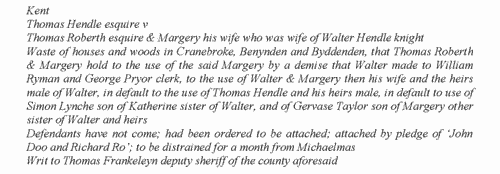
| Kent Entries in the Common Pleas (1558)
The Common Roll of the Common Pleas records litigation before the justices de Banco from throughout England.
CREWE. Cost: £8.00.  | Sample scan, click to enlarge
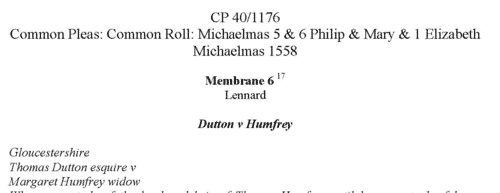
| Prisoners in the Tower of London
(1575)
Sir Owen Hopton, the Lieutenant of the Tower of London, submitted quarterly claims for the expenses of keeping the political and religious dissidents (mostly Roman Catholic recusants) in his charge - a 'keeper' at 5s a week, fuel and candles at 4s a week, and for himself 13s 4d a week, for each prisoner. Those who died in prison or were executed during the period are marked with the word 'mort.' This is the return for Michaelmas 1575CREWE. Cost: £4.00.  | Sample scan, click to enlarge
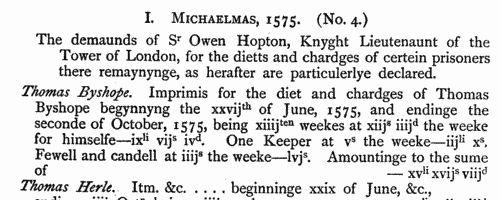
| Cheshire Knights, Esquires, Gentlemen and Freeholders: Nantwich hundred
(1578)
This muster roll, dated 7 October 20 Elizabeth 1578, is entitled 'A booke conteyni'ge the numbre and names of all the knights, esquiers, and gent'm wth freehoulders wthin the countie of Chester, togethers wth their horses, armor and other furnyture of proporc'on beinge also devyded into seurall hundreds accordinge to their peculiar habitac'ons'. Full names are given, with the details of the horsemen, archers, arms and armour each was required to furnish. There are returns from all seven hundreds of the county - Broxton (Broxon), Bucklow (Buckley), Eddisbury (Edisburie), Macclesfield (Mackesfeilde), Nantwich (Namplewiche), Northwich (Northwicke) and Wirral. CREWE. Cost: £4.00.  | Sample scan, click to enlarge
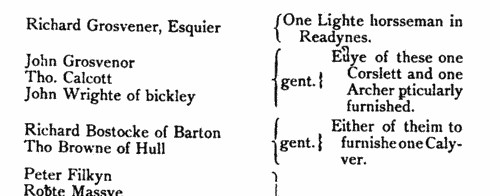
| Lawyers and officers of Lincoln's Inn
(1422-1586)
Lincoln's Inn is one of the ancient inns of court in London exclusively invested with the right to call lawyers to the English bar. The Black Books of Lincoln's Inn are the main administrative records of the society, containing the names of those filling the different offices year by year; the annual accounts of the Pensioner and the Treasurer; regulations; punishments and fines for misdemeanours. This edition, printed for the Inn in 1897, covers the first five surviving volumes.CREWE. Cost: £6.00.  | Sample scan, click to enlarge
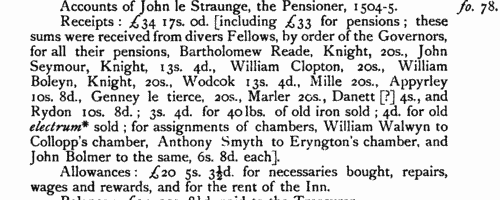
|
Research your ancestry, family history, genealogy and one-name study by direct access to original records and archives indexed by surname.
|












